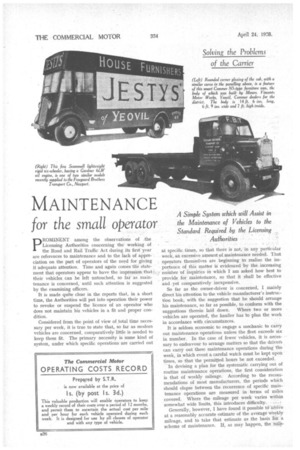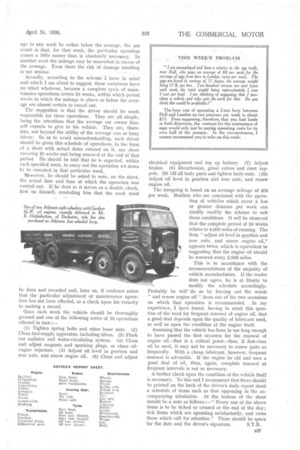MAINTENANCE
Page 40

Page 41

If you've noticed an error in this article please click here to report it so we can fix it.
for the small operator
pROMLNENT among the observations of the Licensing Authorities concerning the working of the Road and Rail Traffic • Act during its first year are references to maintenance and to the lack of appreciation on the part of operators of the need for giving it adequate attention, Time and again comes ttie statement that operators appear to have the impression, that their vehicles can be left untouched, so far as. maintenance is concerned, until such attention is suggested
by the examining officers. • It is made quite clear in the reports that, in a short time, the Authorities will put into operation their power to revoke or suspend the licence of an operator who does not maintain his vehicles in a fit and proper condition.
Considered from the point of view of total time necessary per week, it is true to state that, so far as modern vehicles are concerned, comparatively little is needed to keep them fit. The primary necessity is some kind of system, under which specific operations are carried out
at specific times, so that there is not, in any particular week, an excessive amount of maintenance needed. That operators themselves are . beginning to realize the importance of this matter is evidenced by the increasing number uf inquiries in which I am asked how best to provide for maintenance, so that it shall be effective and yet comparatively inexpensive.
So far as the owner-driver is concerned, I mainly direct his attention to the vehicle manufacturer's instruction book, with the suggestion that he should arrange his maintenance, so far as possible, to conform with the suggestions therein laid down. Where two or more vehicles are operated, the haulier has to plan the work in accordance with circumstances.
It is seldom economic to engage a mechanic to carry out maintenance operations unless the fleet exceeds six in number. In the case of fewer vehicles, it is necessary to endeavour to arrange matters so that the driver's can carry out these maintenance operations during the week, in which event a careful watch must be kept upon times, so that the permitted hours be not exceeded.
In devising a plan for the systematic carrying out of routine maintenance operations, the first consideration is that of weekly mileage. According to the recommendations of most manufacturers, the periods which should elapse between the recurrence of specific maintenance operations are measured in terms of miles covered. Where the mileage per week varies within somewhat wide limits, this introduces difficulty.
Generally, however, I have found it possible td arrive at a reasonably accurate estimate of the average weekly mileage, and to take that estimate as the basis fec a scheme of maintenance. If, as may happen, the m4
age in any week be rather below the average, the net result is that, for that week, the particular operation conies a little sooner than is absolutely necessary. In another week the mileage may be somewhat in excess of the average. Even there the risk of damage resulting is not serious.
Actually, according to the scheme I have in mind and which I am about to suggest, these variations have no effect whatever, because a complete cycle of maintenance operations covers 10 weeks, within which period weeks in which the mileage is above or below the average are almost certain to cancel out.
The suggestion is that the driver should be made responsible for these operations. They are all simple, being the attentions that the average car owner himself expects to give to his vehicle. They are, therefore, not beyond the ability of the average van or lorry driver. So as to avoid misunderstanding, each driver should be given this schedule of operations, in the form of a sheet with actual dates entered on it, one sheet covering 10 weeks and being renewed at the end of that period. He should be told that he is expected, within each specified week, to carry out the operation set down to be executed in that particular week.
'Moreover, he should be asked to note,. on the sheet, the actual date and time at which the operation was carried out. If does so it serves as a double check, first on himself, • reminding him that the work must be done and recorded and, later on, if evidence arises that the particular adjustment or maintenance operation has not been effected, as a check upon his veracity in making a record.
Once each week the vehicle should be thoroughly greased and one of the following series of 10 operations effected in turn :—
(1) Tighten spring, bolts and other loose nuts. (2) Clean fuel-supply apparatus, including filters. (3) Flush out radiator and water-circulating system, (4) Clean and adjust magneto and sparking plugs, or clean oilengine injectors. (5) Adjust oil level in gearbox and rear axle, and renew engine oil. (6) Clean and adjust electrical equipment and top up battery. (7) Adjust brakes. (8) Decarbonize, grind valves and reset tappets. (9) Oil all body parts and tighten body nuts. (10) Adjust oil level in gearbox and rear axle, and renew engine oil. • The foregoing is based on an average mileage of 400 per week. Readers who, are concerned with the opera tion of vehicles which cover a less or greater distance per week can readily modify the scheme to suit those conditions. It will be observed that the complete period of 10 vi'eeks relates to 4,000 miles of running. The item " adjust oil level in gearbox and rear axle, and renew engine oil," appears twice, which is equivalent to suggesting that the engine oil should be renewed every 2,000 miles.
This is in accordance with the recommendations of the majority of vehicle manufacturers. If the reader does not agree, he is at liberty to modify the schedule accordingly.
Probably he will' do so by leaving out the words "and renew engine oil" from one of the two occasions on which that operation is recommended. In my experience, I have found, having in mind this question of the need for frequent renewal of engine oil, that a good deal depends upon the quality of lubricant used, as well as upon the condition of the engine itself.
Assuming that the vehicle has been in use long enough to have passed the first occasion for the renewal of engine• oil—that is a critical point—then, if first-class oil be used, it may not be necessary to renew quite so frequently. With a cheap lubricant, however, frequent renewal is advisable. If the engine be old and uses a good deal of oil, then, again, complete renewal at frequent intervals is not so necessary.
A further check upon the condition of the vehicle itself is necessary. To this end I recommend that there should be printed on the back of the driver's daily report sheet a schedule of items such as that appearing in the accompanying tabulation. At the bottom of the sheet should be a note as follows :—" Every one of the above items is to be ticked or crossed at the end of the day ; tick items which are operating satisfactorily, and cross those which call for attention." There should be space
for the date and the driver's signature. S.T.R.




























































































